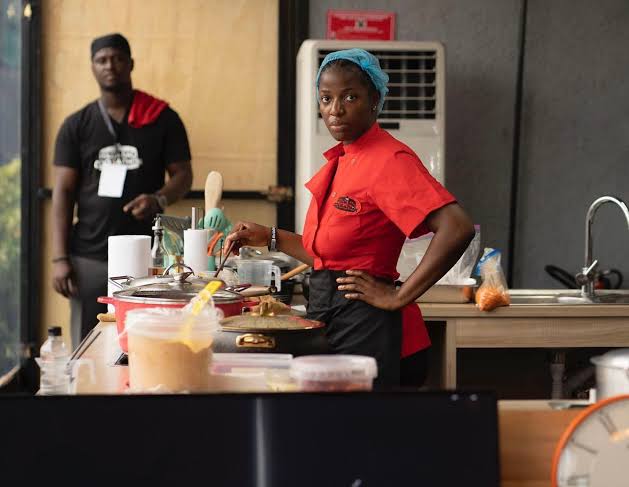Lagos had seen spectacles before. Concerts that shook its streets, political rallies that bent its traffic into knots, vigils that turned sorrow into thunderous prayer. Yet yesterday felt different. Beneath floodlights and phone screens, a cauldron taller than a man simmered with history. Smoke rose in thick ribbons, curling into the humid sky, as if the day itself was uncertain whether to choke or to cheer.
At the center of it all was Hilda Baci, apron tied tight, paddle in hand, her figure half-obscured by the steam that carried the scent of palm oil and tomato paste. Around her, volunteers worked the fire, shifting logs, coaxing flames. Beyond them stood the crowd: restless, watchful, hungry. They weren’t just there for rice. They were there for the story, for the proof that audacity could still boil over in a nation battered daily by doubt.
Expectation hung thick as the smoke. This wasn’t merely a meal; it was a stage, a gamble, a dare. Was the rice washed? Could the pot hold? Would history applaud or collapse into laughter?
The suspense clung to the air like heat off the firewood. Nigerians had gathered to watch not just cooking, but destiny in motion.

To understand why one pot of jollof rice could pull a nation into its orbit, you must leave that night in Lagos for a moment. You must step backward—into history, into rivalry, into the restless hunger of a people who have always turned survival into spectacle. Only then can the smoke, the fire, and the controversy find their true meaning.
Before the Smoke, There Was a Woman
Hilda Effiong Bassey, known as Hilda Baci, did not stumble into the fire by accident. She was born in Akwa Ibom, a land where kitchens are not silent corners but orchestras of clanging pots, sizzling stews, and voices rising in chorus. There, food was not just eaten; it was narrated, celebrated, handed down like scripture. To grow up in Akwa Ibom was to learn that cooking was as much about memory as it was about spice.
But Hilda’s world stretched beyond the mortar and pestle. She was a millennial child of Lagos’ restless energy—a city that demands its young to be bold or invisible.
In 2023, she dared the world by cooking for 100 hours straight, breaking the Guinness World Record for the longest cooking marathon. That feat had been about endurance, grit, and visibility. It made her a household name, her smile plastered across news feeds, her apron turned into a banner of possibility.

Yet ambition is like hunger: it never stays satisfied. After the cook-a-thon, Hilda knew that merely being remembered wasn’t enough. Nigeria, after all, moves on quickly. She needed something bigger, something riskier, something that would take her from trending hashtag to cultural memory. Thus the idea of the giant jollof was born.
This time, it wouldn’t be about hours but about size. A pot so big it mocked reason. Rice stirred not with spoons but with paddles. Flames so high they threatened to consume their own victory. If cooking was her art, then Lagos would be her canvas, and the giant jollof her boldest stroke yet.
Jollof—the Grain That Divides and Unites
To outsiders, rice is rice. But in West Africa, jollof rice is history disguised as food. Its roots trace back to the Wolof Empire of the 14th century, where thieboudienne, a rice and fish dish simmered in tomato sauce, became the ancestor of countless variations. As rice spread along trade routes, each region adapted it, seasoning it with its own climate, culture, and rivalry.
Today, the so-called “Jollof Wars” ignite debates sharper than politics. Nigerians insist theirs is smoky, fiery, made for parties where the grains carry the kiss of firewood. Ghanaians counter that their version is refined, balanced, less chaotic. Senegalese claim authenticity, since history began with them. Even diaspora communities have joined the fray, from London kitchens to American food festivals.
This rivalry is not just about taste; it’s about identity. To cook jollof is to declare allegiance, to claim heritage. Thus, when Hilda set her pot on firewood yesterday in Lagos, she wasn’t just cooking. She was stepping onto a centuries-old battlefield, carrying Nigeria’s culinary flag into the open.
Every stir of her paddle to some was a reply to Ghana, every plume of smoke a reminder to Senegal. The giant jollof was not a meal; it was a manifesto.
Guinness in Africa
Guinness World Records has always been more than a global scoreboard; in Africa, it is a mirror of ambition. Every record attempt speaks to a nation’s yearning not just for recognition, but for dignity. From Ghana’s longest dance marathon to South Africa’s largest braai, from Ethiopia’s mass coffee ceremonies to Nigeria’s own feats, the book has become a battleground of continental pride.
In food, the competition sharpens. West Africa’s cultural rivalry often manifests most famously in the jollof wars — a seemingly lighthearted debate, but one tied deeply to questions of identity, migration, and power. When Ghanaian chef Faila Abdul Razak launched her own Guinness attempt for longest cooking hours, Nigeria responded with Hilda Baci. Each attempt was no longer just individual; it was national. The pots became flags.

So when Hilda turned from hours to volume, from endurance to scale, Africa watched. Could Nigeria, already a Guinness powerhouse in record-breaking, also dominate the most visible food record of all — the largest jollof pot? Could Lagos become not only the city of chaos and dreams, but the city of official Guinness validation?
Guinness thrives on such rivalries. They feed publicity, build suspense, and ensure global attention. Yet, for Nigerians, it was not just about beating Ghana. It was about proving that their chaos could birth legitimacy. That even in smoke and fire, rules could be met, and records etched.
Lagos as a Stage of Excess
If this feat were attempted anywhere else, it might have passed as novelty. But Lagos does not do small. The city’s DNA is written in spectacle—its music loud, its films dramatic, its streets chaotic, its ambitions oversized. Lagos is where impossibility dares itself daily, where a single viral video can outshine a minister, and where a failed attempt can be mocked into eternity.
In this theater of extremes, Hilda’s pot fit naturally. Fabricators built a vessel that seemed almost mythical—steel curved into a cauldron so large it dwarfed its handlers. Firewood was piled like offerings at a shrine, and the flames beneath it roared like an impatient audience. Volunteers wielded paddles that resembled canoe oars, pushing through the rice as though rowing against history itself.

The crowd swelled. Influencers streamed live, vendors sold sachet water to restless onlookers, and police officers struggled to hold back the surge of bodies. Lagos had turned a pot of rice into a carnival. For a city that feeds on drama, the giant jollof was a perfect meal.
But Lagos also loves collapse. In a place where buildings tilt, roads flood, and projects stall, spectacle is never complete without the whisper of failure. And soon enough, whispers began to rise from the smoke.
When Celebrities Stirred the Pot
No Guinness record attempt in Nigeria is complete without the energy of celebrity presence. In Lagos, fame carries as much weight as fire, and on the day of Hilda Baci’s giant jollof, the crowd’s excitement wasn’t only for the pot—it was also for the faces who arrived to stand around it. Their presence turned a culinary marathon into a cultural festival.

Funke Akindele, Nollywood’s box office queen, drew cheers the moment she appeared. Known for her ability to turn everyday Lagos life into blockbuster cinema, her attendance blurred the line between film and reality.
To many, the scene already looked like one of her productions: a massive pot, sweat-streaked cooks, laughter, chaos, and Lagos as its own character. Her endorsement by simply showing up made the event feel like a premiere.

Pastor Bolaji Idowu, charismatic and commanding, brought another layer—faith. Standing near the heat of the flames, he prayed aloud for safety, endurance, and success, his words rising with the smoke.
In a country where spirituality is woven into every ambition, his blessing sanctified the attempt. For some in the crowd, his presence mattered as much as Guinness officials.

Then came the digital forces—faces familiar not from billboards but from screens held in the palm of every hand. Tiktoker Peller, with his sharp humor and knack for viral storytelling, broadcast the spectacle in real time, turning every wobble of the pot and every puff of smoke into moments of entertainment. His commentary made the attempt feel less like a formal record and more like a national drama unfolding on millions of phones.

Enioluwa, the flamboyant lifestyle influencer, played the role of Lagos’ modern griot. Dressed sharply, speaking with flair, he narrated the event with the kind of charm that captured youth audiences. His Instagram updates transformed the cooking pot into a stage of fashion and culture, proving that jollof could be as stylish as it was filling.
And then there was Veekee James, whose steady livestream kept those outside Lagos tethered to the event. For those stuck in traffic, abroad, or at home, his feed was the bridge. Every stir, every nervous cheer, every sigh of relief found its way to global audiences through his lens.

Together, these figures became more than guests. They were amplifiers of meaning. Each represented a part of Nigeria—cinema, faith, humor, youth, digital reach. Their presence showed that Guinness records in Nigeria are not solitary endeavors. They are collective performances, where celebrity attendance is as much a part of validation as the official weighing of rice.
The Controversies
The Whisper of Unwashed Rice
It began like a rumor, soft but sticky. Videos surfaced online showing clumps of rice, grains glued together, their sheen suggesting starch not rinsed away. Critics seized on it: “The rice was not washed!” In Nigerian kitchens, that accusation is heavier than theft.
Washing rice is ritual. It is cleansing, respect, preparation. To skip it is to break faith with tradition, to serve haste where care is demanded. And in a feat meant to represent the nation, such a misstep became unforgivable. Memes blossomed, hashtags trended, debates raged. Was Hilda chasing spectacle at the cost of basics? Had Nigeria’s symbol of pride slipped on the simplest stone?

Her defenders fought back. They argued that scale changes everything, that rice washed in sacks cannot look like rice washed in cups. Others accused critics of envy, of the Nigerian disease of tearing down success. The truth was buried in the steam, impossible to verify, but the damage was done. The giant jollof was no longer just food; it was scandal.
And scandals, in Nigeria, travel faster than fire.
When Pots Refuse to Hold
Cooking for ten is art. Cooking for a thousand is engineering. The science of heat distribution, the chemistry of starch, the mechanics of stirring—all bend under pressure when scale becomes monstrous. The giant pot, under its own weight, began to tilt.
Onlookers gasped. A pot that symbolized ambition now threatened to symbolize collapse. For some, it was comedy—another Nigerian project too heavy for its own foundation. For others, it was heartbreak—a dream betrayed by physics. Phones captured every wobble, every splash, every tremor.
When it finally buckled, the crowd split in reaction. Laughter rippled alongside sighs. Some cursed, some cheered, some simply kept filming. The collapse was both tragedy and inevitability, a metaphor for a nation where dreams often stumble under the weight of their own boldness.
Yet in the smoke that followed, the stirring and cooking did not stop. That, too, was metaphor.

The Weight of Expectation
Why should one pot of rice matter so much? Why should crowds sweat in Lagos, tweets fly across oceans, critics and fans lock horns over grains? The answer lies in Nigeria’s hunger—not for food, but for triumph.
In a nation battered by inflation, unemployment, and insecurity, collective victories become rare oxygen. Hilda’s jollof was not hers alone; it was borrowed pride, a temporary relief, a spectacle to remind Nigerians that they could still break, still build, still dare.
But expectation is dangerous. To become a vessel of national pride is to also be a target of national disappointment. Every clump of rice, every wobble of the pot became a metaphor. Hilda stirred rice, but the nation stirred its own anxieties.
The weight of the pot was heavy, but the weight of expectation was heavier.
Did Guinness Approve?
When the fires cooled and the pot was measured, weighed, and documented, the real test began. Guinness is unforgiving. A single error in measurement, a missed video angle, a broken witness log — any could void an attempt. Spectacle alone is never enough.
Reports swirled. Some insisted officials were present, cameras recording, logs signed. Others doubted whether all Guinness protocols had been observed. In Nigeria’s buzzing digital sphere, speculation ran wilder than fact. Was the record valid? Would Guinness confirm? Or would the attempt join the many African feats lost to poor documentation?
Guinness, of course, moves slowly. Verification can take months. The public, restless, demanded instant judgment. Yet the delay only deepened the myth. In a way, uncertainty kept the attempt alive longer than confirmation would have. As long as Guinness had not spoken, the debate itself was fuel.
For Guinness, records are about precision. For Nigerians, they are about story. The gap between these two worlds was evident, and the giant jollof lived in that tension.
Lessons in Smoke and Ash
When the fires cooled, when the pot stood scarred, when the crowd dispersed into Lagos traffic, what remained was not simply rice. What remained was narrative. Nigerians argued, joked, analyzed. They compared the giant jollof to politics, to infrastructure, to national character. Some declared it waste, others genius.
But beneath the noise, lessons lingered. That ambition is both necessary and fragile. That spectacle can unite but also divide. That food is never just food in Nigeria; it is memory, identity, and metaphor. And that resilience often looks less like triumph and more like the act of continuing to stir even when the pot collapses.

Smoke and ash are not the absence of fire; they are its testimony. The giant jollof left both, proof that Nigeria had once again dared to cook itself into memory.
Final Reflection: Beyond the Pot
In the end, history will not remember the clumps of rice, nor the tilting of the pot, nor even the Guinness debates. History will remember the audacity—the night Lagos turned a pot of rice into a theater of pride, doubt, scandal, and resilience.
Hilda Baci will remain its face, apron tied against fire, paddle steady against collapse. But the story will belong to Nigeria itself: a country that demands to be seen, even if through smoke; that insists on daring, even if failure lurks; that continues to stir, even when the pot burns.
The giant jollof was never about rice. It was about Nigeria’s restless hunger to prove, to perform, to belong. In that sense, it succeeded—because it will be retold, debated, and remembered long after the last grain was swallowed by the Lagos night.














